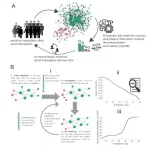(Press-News.org) Specific combinations of long term conditions have a major role in the additional pressures the NHS faces every winter, because they are associated with significantly higher risks of hospital admissions and death, finds research published in the open access journal BMJ Medicine.
The risk of hospital admission was 11 times higher among those with the quartet of cancer, kidney disease, cardiovascular disease, and type 2 diabetes than it was among those without any of these long term conditions, the findings show.
And people with kidney disease, cardiovascular disease, dementia, and osteoarthritis were 24 times more likely to die as those who didn’t have these conditions.
Winter pressures are prompted by the worsening of health issues as a result of colder weather, seasonal viruses, increased isolation and loneliness, plus systems level difficulties caused by higher bed occupancy and staff absences, explain the researchers. These additional pressures usually cover the period from December 1 to March 31.
The number of people in England with 2 or more long term conditions is projected to include almost 70% of the population by 2035. And while previously published research has established the increased health service demand related to multiple long term conditions during the winter, it’s not clear exactly which combinations might be the most critical, say the researchers.
To try and find out, they reviewed routinely collected and linked primary and secondary care health data for adults in England, during the winter pressures period of 2021-22, to identify the reasons for hospital admission. This period coincided with the COVID-19 pandemic when health and social care services were substantially disrupted.
Complete data were available for 48.3 million people, just over half of whom were women (51%). Their average age was 49, and 81% of them were White.
The researchers selected 59 long term conditions which were categorised into 19 groups, based on feedback from clinicians, patients, and policy-makers.
During the study period, 4,710,675 hospital admissions and 176,895 deaths were recorded. Overall, nearly 20 million people (40.5%) had no long term conditions; 13.5 million (28%) had one; and nearly a third (15 million; 31%) had 2 or more.
Analysis of the data showed that particular combinations of long term conditions were associated with heightened risks of hospital admission and death.
After factoring in age, sex, ethnicity, and area based socioeconomic deprivation, people with cancer, kidney disease, cardiovascular disease, and type 2 diabetes were 11 times more likely to be admitted to hospital during the winter than those who didn’t have this combination.
Similarly, this risk was nearly 10 times higher for those with cancer, chronic kidney disease, cardiovascular disease, and osteoarthritis, and those with cancer, chronic kidney disease, and cardiovascular disease.
Among the 10 combinations that contributed to the highest rates of hospital admissions, cardiovascular disease featured in all but 1, chronic kidney disease in 8, and cancer in 6.
Analysis of the deaths linked to particular combinations of long term conditions showed that people with cardiovascular disease and dementia were nearly 15 times more likely to die than those with neither of these conditions.
And those with the combination of kidney disease, cardiovascular disease, dementia, and osteoarthritis were more than 24 times more likely to do so.
Cardiovascular disease featured in all 10 of the riskiest combinations, while chronic kidney disease featured in 7 of them.
Cardiovascular disease plus dementia also featured in all of the top 5 riskiest combinations, and this duo was associated with a substantially higher rate of death than many 3, 4, and 5 long term condition combinations.
This is an observational study, precluding firm conclusions to be drawn about causal factors. And the researchers acknowledge various limitations to their findings, including the lack of information about the length or severity of illness or frailty among those with long term conditions.
But they point out: “Current policy and clinical guidance consider the risk of hospital admission and death for multiple long term conditions during the winter season as one homogenous condition,” when this is clearly not the case.
And they suggest that the findings could help inform more targeted planning for winter pressures, enabling resources to be allocated where they are needed the most.
“Multimorbidity patterns are a major determinant of hospital admission and mortality during winter,” agree Dr Jonathan Batty and colleagues of the University of Leeds, in a linked editorial.
“In the broader context of winter pressures and increasing multimorbidity, [the study] underscores the need for methods that can identify individuals at high risk of preventable hospital admission and mortality, and strategies to mitigate the risk observed for those people with the most adverse combinations of long term conditions,” they conclude.
END
Specific long term condition combinations have major role in NHS ‘winter pressures’
Cardiovascular disease, cancer, kidney disease, diabetes quartet linked to 11-fold higher hospital admission risk. Kidney disease + cardiovascular disease + dementia + osteoarthritis linked to 24-fold higher death risk
2024-11-13
ELSE PRESS RELEASES FROM THIS DATE:
Men often struggle with transition to fatherhood amid lack of targeted information and support
2024-11-13
Men often struggle with the transition to fatherhood amid a lack of information and emotional support targeted to their needs, suggests a review of the available qualitative evidence, published in the open access journal BMJ Open.
Greater focus is needed in clinical practice, antenatal services, and research on men’s unique experiences of the perinatal period, which encompasses pregnancy and the first 12 months after the birth, say the researchers.
Pregnancy and childbirth can be an anxious time for new parents, and the transition to fatherhood—defined ...
More green space linked to fewer preventable deaths in most deprived areas of UK
2024-11-13
The provision of just 1% more green space in the most deprived urban neighbourhoods in 3 out of the 4 UK nations may be linked to around 40% fewer preventable deaths in these areas, finds research published online in the Journal of Epidemiology & Community Health.
Green space is unequally distributed in England, Scotland, and Northern Ireland, with the lowest amounts in the most deprived areas, the findings show, prompting the researchers to suggest that green space investment might be an important public health strategy for tackling health inequalities.
Spending time ...
Immunotherapy drug pembrolizumab improves outcomes for patients with soft tissue sarcoma
2024-11-13
Addition of the immunotherapy drug pembrolizumab to standard of care for patients with advanced soft tissue sarcoma of the limb significantly improved disease-free survival, according to the results of the SU2C-SARC032 clinical trial led by researchers from the University of Pittsburgh, UPMC, Duke University and Princess Margaret Cancer Centre, University Health Network.
The findings, published today in The Lancet, establish pembrolizumab as a new option for patients with this disease.
“Soft tissue sarcoma is a rare and complex disease with over 50 different subtypes, which makes it hard to study in large clinical trials,” said lead author ...
A formula for life? New model calculates chances of intelligent beings in our Universe and beyond
2024-11-13
The chances of intelligent life emerging in our Universe – and in any hypothetical ones beyond it – can be estimated by a new theoretical model which has echoes of the famous Drake Equation.
This was the formula that American astronomer Dr Frank Drake came up with in the 1960s to calculate the number of detectable extraterrestrial civilisations in our Milky Way galaxy.
More than 60 years on, astrophysicists led by Durham University have produced a different model which instead focuses on the conditions created by the acceleration of the Universe's expansion and the amount ...
Could a genetic flaw be the key to stopping people craving sugary treats?
2024-11-13
The work provides novel genetic insights into dietary preferences and opens the possibility of targeting SI to selectively reduce sucrose intake at the population level.
The study was led by Dr. Peter Aldiss, now a group leader in the School of Medicine at the University of Nottingham, alongside Assistant Professor Mette K Andersen, at the Novo Nordisk Foundation Centre for Basic Metabolic Research in Copenhagen and Professor Mauro D’Amato at CIC bioGUNE in Spain and LUM University in Italy. It also involves scientists internationally from Copenhagen, Greenland, Italy and Spain as part of the ‘Sucrase-isomaltase working group’.
Dr Aldiss said: “Excess ...
Experts urge complex systems approach to assess A.I. risks
2024-11-13
[Vienna, November 13, 2024] — With artificial intelligence increasingly permeating every aspect of our lives, experts are becoming more and more concerned about its dangers. In some cases, the risks are pressing, in others they won't emerge until many months or even years from now. Scientists point out in The Royal Society’s journal that a coherent approach to understanding these threats is still elusive. They call for a complex systems perspective to better assess and mitigate these risks, particularly in light of long-term uncertainties and complex interactions between A.I. and society.
"Understanding the risks of A.I. requires recognizing the intricate interplay ...
Fossil fuel CO2 emissions increase again in 2024
2024-11-13
Global carbon emissions from fossil fuels have reached a record high in 2024, according to new research by the Global Carbon Project science team.
The 2024 Global Carbon Budget projects fossil carbon dioxide (CO 2) emissions of 37.4 billion tonnes, up 0.8% from 2023.
Despite the urgent need to cut emissions to slow climate change, the researchers say there is still “no sign” that the world has reached a peak in fossil CO2 emissions.
With projected emissions from land-use change (such as deforestation) of 4.2 billion tonnes, total CO2 emissions are projected to be 41.6 billion tonnes in 2024, up from 40.6 billion tonnes last year.
Over the last 10 years, fossil ...
Winners of Applied Microbiology International Horizon Awards 2024 announced
2024-11-13
The winners of the Applied Microbiology International Horizon Awards 2024 have been announced.
The prizes, awarded by the learned society Applied Microbiology International (AMI), celebrate the brightest minds in the field and promote the research, group, projects, products and individuals who continue to help shape the future of applied microbiology.
The One Health Microbiome Center at Penn State has been named as this year’s winner of the WH Pierce Global Impact in Microbiology Prize 2024.
This award acknowledges and celebrates individuals, teams, or organisations that have made groundbreaking contributions to global challenges through applied microbiology.
The One Health Microbiome ...
A toolkit for unraveling the links between intimate partner violence, trauma and substance misuse
2024-11-12
The opioid crisis has left an estimated 2.5 million people 18 and older in the U.S. with opioid use disorder, or OUD. Despite increased attention to the heavy toll taken by OUD, key risk factors such as intimate partner violence (IPV) and post-traumatic stress disorder (PTSD) are often overlooked. Both increase the risk of OUD and complicate recovery efforts.
A team of MUSC researchers led by clinical psychologists Amber Jarnecke, Ph.D., and Tanya Saraiya, Ph.D., both of the Department of Psychiatry and Behavioral ...
Can everyday physical activity improve cognitive health in middle age?
2024-11-12
HERSHEY, Pa — Exercise has been shown to improve brain health and reduce the risk of cognitive decline and dementia over the long-term. But engaging in everyday physical activity has immediate benefits for brain health, according to a new study from researchers in the Penn State College of Medicine.
The team found that middle-aged people who participated in everyday movement showed improvement in cognitive processing speed equivalent to being four years younger, regardless of whether the activity was lower intensity, like walking the dog or doing household chores, or higher intensity, like jogging.
The findings were published ...
LAST 30 PRESS RELEASES:
Meningococcal B vaccination does not reduce gonorrhoea, trial results show
AAO-HNSF awarded grant to advance age-friendly care in otolaryngology through national initiative
Eight years running: Newsweek names Mayo Clinic ‘World’s Best Hospital’
Coffee waste turned into clean air solution: researchers develop sustainable catalyst to remove toxic hydrogen sulfide
Scientists uncover how engineered biochar and microbes work together to boost plant-based cleanup of cadmium-polluted soils
Engineered biochar could unlock more effective and scalable solutions for soil and water pollution
Differing immune responses in infants may explain increased severity of RSV over SARS-CoV-2
The invisible hand of climate change: How extreme heat dictates who is born
Surprising culprit leads to chronic rejection of transplanted lungs, hearts
Study explains how ketogenic diets prevent seizures
New approach to qualifying nuclear reactor components rolling out this year
U.S. medical care is improving, but cost and health differ depending on disease
AI challenges lithography and provides solutions
Can AI make society less selfish?
UC Irvine researchers expose critical security vulnerability in autonomous drones
Changes in smoking status and their associations with risk of Parkinson’s, death
In football players with repeated head impacts, inflammation related to brain changes
Being an early bird, getting more physical activity linked to lower risk of ALS
The Lancet: Single daily pill shows promise as replacement for complex, multi-tablet HIV treatment regimens
Single daily pill shows promise as replacement for complex, multi-tablet HIV treatment regimens
Black Americans face increasingly higher risk of gun homicide death than White Americans
Flagging claims about cancer treatment on social media as potentially false might help reduce spreading of misinformation, per online experiment with 1,051 US adults
Yawns in healthy fetuses might indicate mild distress
Conservation agriculture, including no-dig, crop-rotation and mulching methods, reduces water runoff and soil loss and boosts crop yield by as much as 122%, in Ethiopian trial
Tropical flowers are blooming weeks later than they used to through climate change
Risk of whale entanglement in fishing gear tied to size of cool-water habitat
Climate change could fragment habitat for monarch butterflies, disrupting mass migration
Neurosurgeons are really good at removing brain tumors, and they’re about to get even better
Almost 1-in-3 American adolescents has diabetes or prediabetes, with waist-to-height ratio the strongest independent predictor of prediabetes/diabetes, reveals survey of 1,998 adolescents (10-19 years
Researchers sharpen understanding of how the body responds to energy demands from exercise
[Press-News.org] Specific long term condition combinations have major role in NHS ‘winter pressures’Cardiovascular disease, cancer, kidney disease, diabetes quartet linked to 11-fold higher hospital admission risk. Kidney disease + cardiovascular disease + dementia + osteoarthritis linked to 24-fold higher death risk



